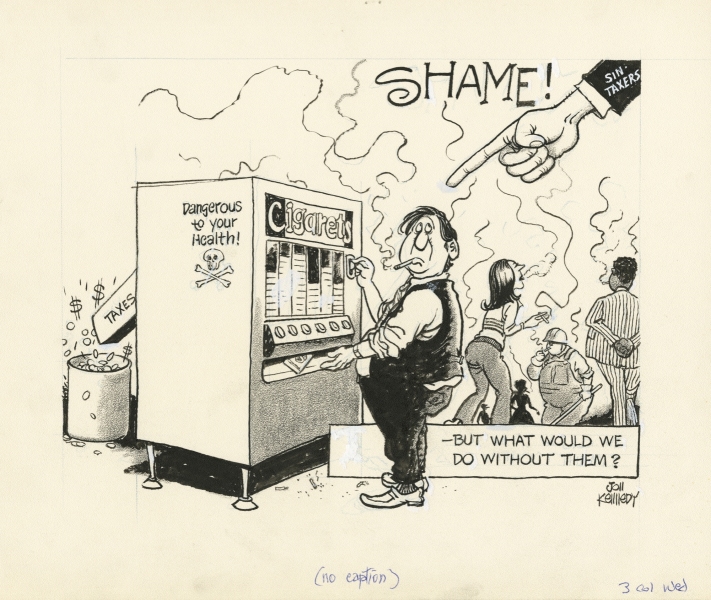The 1990s and early 2000s began and ended with Arkansas near the top of lists ranking the unhealthiest states in the United States. Obesity, COPD, drug abuse, and diabetes were just a few of the diseases that shortened the lives of Arkansans. During both his tenures as a state senator (1991-1997) and U.S. congressman (1997-2011), Vic Snyder, a physician and lawyer, sponsored and supported bills that addressed a wide range of public health and medical concerns.
HEALTHCARE LEGISLATION IN
Arkansas State Senate
From 1990 to 1999, the Arkansas Legislature and the Arkansas Department of Health adopted a number of public policies and measures designed to protect and improve the health of the state’s citizens. One of Snyder’s first legislative accomplishments as a state senator was Act 543 of 1991, which imposed criminal penalties for providing cigarettes to minors and barred tobacco companies from handing out free samples on public streets and within 500 feet of public schools and playgrounds. In 1995, Snyder sponsored a bill (later Act 1123) that required insurance companies to cover drugs for the treatment of specific cancers, even if the drug was not approved by the United States Food and Drug Administration—but was recognized for its effectiveness by the medical community—for that particular form of the disease.
TOBACCO
Settlement
The dangers of smoking had long been known, but by the late 1990s, the large tobacco companies were forced to publicly acknowledge just how detrimental their product was to the public’s health. Forty state attorneys general sued the major tobacco companies seeking monetary, equitable, and injunctive relief. The companies looked to the U.S. Congress for a national settlement so as to avoid multiple—and possibly endless—lawsuits. Known as the 1997 National Settlement Proposal, it called for payments to the states of $368.5 billion over 25 years, imposed Food and Drug Administration oversight, and placed restrictions on types of advertising. The settlement was rejected by Congress in 1998. Even while a national solution was being debated, some individual states settled with the major tobacco companies. By the end of 1998, the four major manufacturers of tobacco products had entered into agreements with all fifty states, the District of Columbia, Puerto Rico, and the Virgin Islands.
These states, including Arkansas, benefited greatly from this settlement. Arkansas’s share funded public campaigns on the dangers of both smoking and smokeless tobacco use, and it also led to the creation of the College of Public Health at the University of Arkansas for Medical Sciences (UAMS) in 2001. The tobacco settlement funds are still being used to educate the public and train public health professionals. Congressman Snyder continued to work at the federal level on curbing tobacco companies' influence on Americans. In 2009, Snyder co-sponsored the Family Smoking Prevention and Tobacco Control Act (H.R. 1256), which would impose new warnings and labels on tobacco packaging and advertisements.
HEALTH
Insurance
A major milestone in health care legislation was the passage of the Patient Protection and Affordable Care Act (colloquially referred to as Obamacare). During the Presidential race in 2008, Democratic candidates Barack Obama and Hillary Clinton both advocated for healthcare reform. After Obama’s election, he kept his campaign promise to deliver a comprehensive healthcare package that would cover over 45 million uninsured Americans. This act required most individuals to obtain health insurance and provided a marketplace where people could purchase policies. Additionally, insurance companies could not deny coverage to individuals for pre-existing conditions. After years of debate, President Obama signed the Affordable Care Act into law on March 23, 2010. Congressman Snyder was one of 219 –all Democrats—to vote for the passage of the act, which is considered a hallmark of President Obama’s tenure as well as a defining moment in American healthcare.
While serving as a state senator and U.S. Congressman, Vic Snyder was involved in important legislation designed to address the health-care access inadequacies and the unhealthy condition of the country’s citizens. Healthcare reform continues to be a controversial issue, but significant gains at both the state and national levels to improve access to physicians and information were made in the 1990s and 2000s.
While serving as a state senator and U.S. Congressman, Vic Snyder was involved in important legislation designed to address the health-care access inadequacies and the unhealthy condition of the country’s citizens. Healthcare reform continues to be a controversial issue, but significant gains at both the state and national levels to improve access to physicians and information were made in the 1990s and 2000s.
For More Information:
Arkansas State Legislature. “Act 543 of 1991.” 78th General Assembly., Reg. Sess. 1991. Accessed November 10, 2021. https://www.arkleg.state.ar.us/Acts/FTPDocument?path=%2FACTS%2F1991%2FPublic%2F&file=543.pdf&ddBienniumSession=1991%2FR.
“Master Settlement Agreement.” National Association of Attorneys General. Accessed November 10, 2021. https://www.naag.org/our-work/naag-center-for-tobacco-and-public-health/the-master-settlement-agreement/.
“Rep. Victor ‘Vic’ Snyder.” GovTrack. Accessed November 10, 2021. https://www.govtrack.us/congress/members/victor_snyder/400383.
Teske, Steven. “Victor F. Snyder (1947–).” Encyclopedia of Arkansas. Central Arkansas Library System. Last modified August 21, 2015. https://encyclopediaofarkansas.net/entries/victor-f-snyder-4655/.
About the Author:
Tim Nutt is the Director of the Historical Research Center at the University of Arkansas for Medical Sciences (UAMS). Formerly, he served as Head of Special Collections at the University of Arkansas, Fayetteville, and Deputy Curator of the Butler Center for Arkansas Studies at the Central Arkansas Library System. He was the founding Managing Editor and Staff Historian for the award-winning, online resource Encyclopedia of Arkansas.


